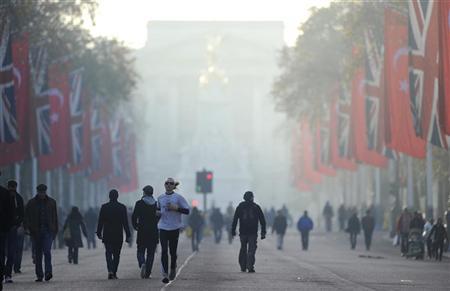By Michael Holden
LONDON | Sun Nov 20, 2011 5:56pm GMT

(Reuters) – President Abdullah Gul said Sunday Turkey was determined to overcome opposition to its bid to join the European Union before beginning a visit to Britain that underlines the growing political and economic ties between the two countries.
Gul’s visit to London, where he will be a guest of Queen Elizabeth, symbolises Britain’s push for closer links with emerging markets such as Turkey.
Britain hopes that increasing trade and investment with fast-growing economies such as Turkey will boost the British economy’s anaemic recovery from recession at a time when key trading partners in the euro zone are mired in a debt crisis.
Britain supports Turkey’s bid to join the EU. The two countries also increasingly see eye-to-eye on how to handle Syrian President Bashar al-Assad’s crackdown on protests, with Turkey threatening sanctions unless the bloodshed stops.
Gul, due to arrive in Britain later Sunday for the first state visit by a Turkish president in 23 years, said in an interview with a British newspaper published Sunday that Turkey was determined to join the EU despite the euro zone crisis and could become the bloc’s economic “growth engine.”
He rejected concerns that the economic problems facing the euro zone meant that any further expansion of the 27-member EU should be put on hold.
“Some people who think in a narrow scope and who do lack a strategic perspective consider Turkey’s membership a burden,” Gul told the Sunday Telegraph.
“But those who can think 30 years, 60 years ahead, and who can think about the changing trends in the economy and the changing centres of power, can understand how much strength Turkey can bring to the existing strength of Europe.”
Gul is likely to repeat that message Monday when he addresses the annual conference of the Confederation of British Industry, Britain’s main employers’ group.
STATE VISIT BEGINS ON TUESDAY
Gul’s state visit, sprinkled with banquets, parades and ceremony, formally begins Tuesday when he holds talks with British Prime Minister David Cameron, who visited Turkey last year. Cameron set a goal of doubling British trade with Turkey, then worth around $9 billion a year, over the next five years.
EU countries agreed unanimously in 2005 to start talks with mainly Muslim Turkey with the goal of full membership.
However, French President Nicolas Sarkozy is opposed to Turkey joining and German Chancellor Angela Merkel says she favours a “privileged partnership” for Turkey.
Gul said Turkey’s booming economy, which grew 11 percent in the first quarter of 2011, could give Europe a shot in the arm.
“Consider the potential that Turkey has: Turkey’s position, her assets, the value she can add in terms of energy resources, her population, the dynamism she can bring into Europe, and also the growth that she can bring, with Turkey being the engine of this growth.”
He said Turkey viewed the euro zone crisis as a temporary situation. “We approach the negotiations with a strategic vision, and are very determined.”
Like Britain, which has called for Assad to step down, Turkey has taken a tough approach on Syria.
“I strongly believe that there is no place any more for authoritarian regimes – single party systems that do not have accountability or transparency – on the shores of the Mediterranean,” Gul said.
Turkey hosts the main Syrian opposition and has given refuge to defecting Syrian soldiers.
British Foreign Secretary William Hague will step up contacts with opponents of Assad Monday, meeting Syrian opposition representatives in London.
The United States and EU have been swift to approve sanctions against Damascus. Turkey has been more cautious but said this month it was preparing a list of sanctions against Syria to complement a Turkish arms embargo already in place.
(Additional reporting by Adrian Croft; Editing by Ralph Gowling and Elizabeth Piper)
via Gul says Turkey can be EU’s growth engine | Reuters.